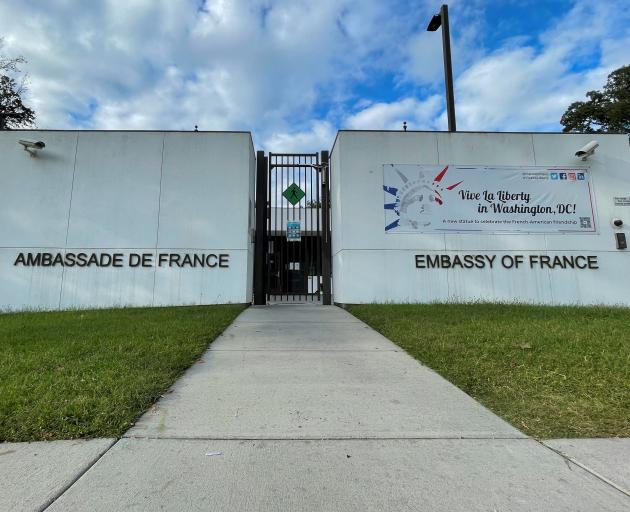
The rare decision taken by French President Emmanuel Macron was made due to the seriousness of the matter, Foreign Minister Jean-Yves Le Drian said in a statement.
On Thursday, Australia said it would scrap the $40 billion deal with France's Naval Group to build a fleet of conventional submarines and would instead build at least eight nuclear-powered submarines with U.S. and British technology after striking a trilateral security partnership. France called it a stab in the back.
A White House official said the United States regretted the French decision and that Washington had been in close touch with France over it. The official said the United States would be engaged in coming days to resolve differences with France.
A spokesperson for Australia’s prime minister declined to comment on the matter.
A diplomatic source in France said it was the first time Paris had recalled its own ambassadors in this way. The foreign ministry statement made no mention of Britain, but the diplomatic source said France considered Britain had joined the deal in an opportunistic manner.
"We don't need to hold consultations with our (British) ambassador to know what to make of it or to draw any conclusions," the source added.
Le Drian said the deal was unacceptable.
"The abandonment of the submarine project ... and the announcement of a new partnership with the United States aiming at launching new studies for future possible nuclear propulsion cooperation is unacceptable behaviour between allies," he said in a statement on Friday.
"The consequences touch the very concept that we have of alliances, our partnerships and the importance of the Indo-Pacific for Europe."
U.S. Secretary of State Antony Blinken tried on Thursday to calm the French outcry, calling France a vital partner in the Indo-Pacific.
Earlier on Friday, Australian Prime Minister Scott Morrison rejected French criticism that it had not been warned about the new deal, and said he had raised the possibility in talks with the French president that Australia might scrap the 2016 submarine deal with a French company.
Morrison acknowledged the damage to Australia-France ties but insisted he had told Macron in June that Australia had revised its thinking.
"I made it very clear, we had a lengthy dinner there in Paris, about our very significant concerns about the capabilities of conventional submarines to deal with the new strategic environment we're faced with," he told 5aa Radio.
"I made it very clear that this was a matter that Australia would need to make a decision on in our national interest."
The French announcement came as Australia's Foreign Minister Marise Payne was speaking at the American Enterprise Institute think tank in Washington. She gave no sign she was aware of it.
Referring to the submarine deal, Payne said such commercial and strategic decisions were difficult to manage, but, responding to a question, she said there was "no question" that France remained a valued ally.
"I absolutely understand the disappointment," she said.
"My task is to work as hard as I can ... to make sure that they do understand the value we place on the role that they play and do understand the value we place on the bilateral relationship and the work we want to continue to do together."
The strained ties among the long-time allies come as the United States and its allies seek additional support in Asia and the Pacific given concern about the rising influence of a more assertive China.
France is about to take over the presidency of the European Union, which on Thursday released its strategy for the Indo-Pacific, pledging to seek a trade deal with Taiwan and to deploy more ships to keep sea routes open.
Pierre Morcos, a visiting fellow at Washington's Center for Strategic and International Studies, called France's move "historic."
"Reassuring words such as those heard yesterday from Secretary Blinken are not enough for Paris - especially after French authorities learned that this agreement was months in the making," he said.
Comments
Oh dear!...Yet MORE evidence that the 47 year Washington politician, Joe Biden is woefully out of his depth on international affairs.
The question is, how much worse can it get? Because waiting in the wings to replace Joe is Kamala Harris, who is universally disliked by republicans AND democrats. This is the same woman who pulled out of the race for president in 2020 due to her campaign consistently being unable to surpass single digits in most polls. And the same Harris who spent a very brief 5 hours at
the US/Mexico border, an astounding 94 days after Joe Biden put her in charge of tacking the border crisis that saw hundreds of thousands demanding entry into America!....If Biden steps down, things will go from bad to worse overnight!
If you say so.
Australia loses trustworthiness in business. A French cultural advisor should have been advising S Morrison.
Yes I do say so!...It's called having an opinion.
Let's be honest...The media spent 4 years attacking every single aspect of the Trump administration. So it's only fair Joe Biden is subjected to that same amount of 'attention' and more, given his 47 years experience in Washington and 8 years as vice president!
Biden should be so ready for the Oval Office, that every decision he makes will no doubt the correct one!...Right?!
As much as you want to, you can't blame Trump for the border crisis, rising cost of living, failure to beat covid 19, Afghanistan troop withdrawal catastrophe and now the straining of ties with France. It's ALL on Biden!












